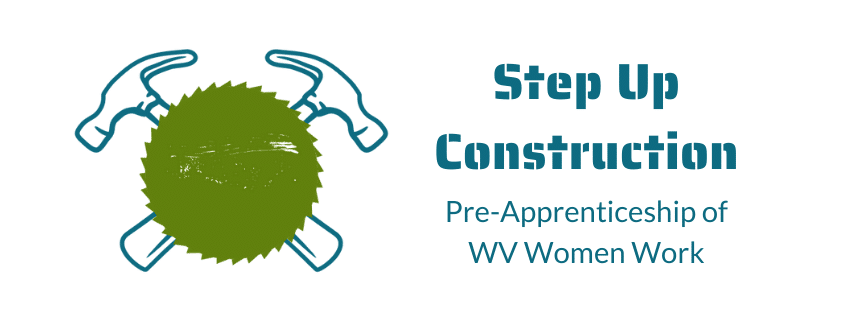
Work-Ready in 12 Weeks: Your Path to a Trades Career Starts Here
Step Up Construction Pre-Apprenticeship Program
Locations: 201 New Jersey Street, Morgantown, WV 26501 & 501 19th Street, Dunbar, WV 25064
Start Your Path in the Trades
Step Up Construction is West Virginia’s only Department of Labor recognized pre-apprenticeship program. In 12 weeks, you will explore a wide range of construction careers, learn basic hands-on skills, and prepare for entry-level jobs or apprenticeship opportunities.
This program gives you a strong start. It is not a full trade school, and you will not become a carpenter, electrician, plumber, or welder in 12 weeks, but you will build a solid foundation that helps you move forward with confidence.
No experience is required to join Step Up. Each class includes people with different skill levels. Some students have been around tools before, and others are completely new. The program teaches the basics so everyone can follow along, learn safely, and grow at a pace that works for them.
A Mix of Classroom and Hands-On Learning
The first part of the program focuses on safety and job-readiness. You must complete OSHA 10 before using power tools, so the early weeks include more classroom time. After OSHA 10 is finished, most weeks include a balanced mix of hands-on projects and classroom lessons.
Step Up follows an apprenticeship-style attendance system. Because the program moves quickly, missing a day makes it hard to repeat lessons. Students can earn demerits for absences or lateness, and too many demerits may affect graduation.
We include job-readiness lessons because employers tell us these skills are needed on real job sites. These lessons strengthen your communication, teamwork, and workplace confidence so you can step into your new career prepared.
Every cohort includes guest speakers and site tours. These give you a chance to learn about different careers, meet industry professionals, and see real workplaces. Speakers and tour locations may vary based on partner availability.
Explore Many Trades Through Hands-On Practice
During the program, you will rotate through several areas of the construction field. Each section includes safety, basic knowledge, and introductory hands-on work. Projects may change based on instructors and community needs.
Carpentry
measuring and cutting
tool safety
basic framing and small project builds
Past carpentry projects include:
picnic tables
toolboxes
sheds
blessing boxes
Plumbing
safety and theory
using basic tools
simple fixture installation
Hands-on plumbing practice includes:
installing a kitchen sink
installing a toilet
basic soldering
tour of the Plumbers and Pipefitters training center
Electrical
safety and basic theory
introduction to electrical tools
simple wiring practice
Hands-on electrical work includes:
wiring a three-way switch
tour of the IBEW training center
Intro to Welding
very basic introduction
torch cutting
offered when an instructor is available
not guaranteed every cohort
Other Experiences (May Vary by Cohort)
These additional activities depend on partner and instructor availability. Past cohorts have had:
basic auto maintenance
masonry
equipment demonstrations
- self defense
These extra experiences are added whenever possible.
Physical and Weather Expectations
Construction work often takes place in active, real-world environments, and our hands-on projects reflect that. Some days may involve standing for long periods, lifting materials, or using tools. There may also be times when we work outdoors or in shop spaces that are not fully heated or cooled.
We encourage students to dress for the weather and be prepared for warm, cold, or wet conditions. These experiences help you understand what different trades are like and prepare you for real job sites. If you have concerns or need help with proper work gear, please let staff know so we can support you.
Personal Responsibility
Step Up works best when students take an active role in their learning. This means showing up each day ready to participate, communicating with staff if something comes up, and taking ownership of assignments and certifications. We move quickly through many topics, and staying involved helps you build the skills and confidence you need for a real job site.
We are here to support you, answer questions, and help you overcome challenges, but your progress also depends on your participation and effort. When students and staff work together, everyone succeeds.
Drug and Alcohol Expectations
Construction careers and apprenticeship programs often require pre-employment drug testing, and many job sites have strict safety rules. To help students prepare for real workplace expectations, Step Up does not allow drugs or alcohol during class hours or on program property. Violating this policy may result in removal from the program.
We want every student to be safe and ready for opportunities after graduation. If you have questions or concerns about employer requirements, staff can help you understand what to expect and how to prepare for your next step.
Community Project Week
You will also take part in a week focused on community projects. This gives you more hands-on practice while supporting local organizations.
Past community projects include:
drywall installation
painting
building a deck
repairs for community groups
volunteering at food pantries
Certifications You Will Earn
All students receive:
OSHA 10 Construction
Forklift Certification
First Aid, CPR, and AED
Plumber in Training License
HVAC Trainee License
These certifications help you stand out when applying for jobs or apprenticeships.
Connections That Help You Take the Next Step
Throughout the program, you will meet contractors, apprenticeship coordinators, and other industry professionals through guest speakers and site tours. We share job openings with students as they come in, and employers often contact us looking for new workers. We do our best to connect you with as many opportunities as possible so you can build your network and explore jobs that match your interests.
What Step Up Is and What Step Up Is Not
Step Up Is:
a pre-apprenticeship
a 12-week introduction to many trades
basic skills and job-readiness training
hands-on practice across several areas
a path to entry-level work or an apprenticeship
a place to explore career options before choosing a trade
Step Up Is Not:
a trade school
full training in one specific trade
a program where you become a carpenter, electrician, plumber, or welder
Take Your First Step Into the Trades
If you are ready to start a new career and learn the skills employers look for, Step Up can help you move forward. You do not need any experience. You only need a strong work ethic and a willingness to learn.
Apply now to begin your path into the trades.
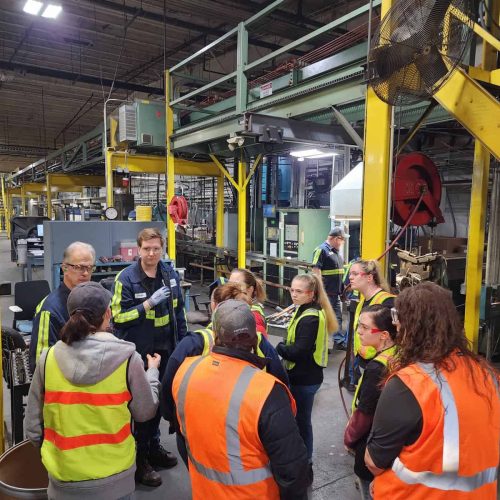
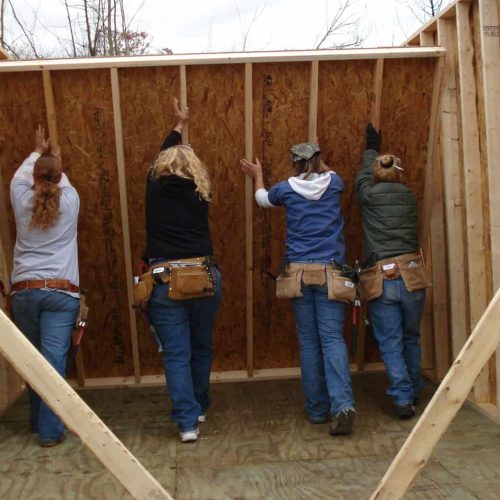
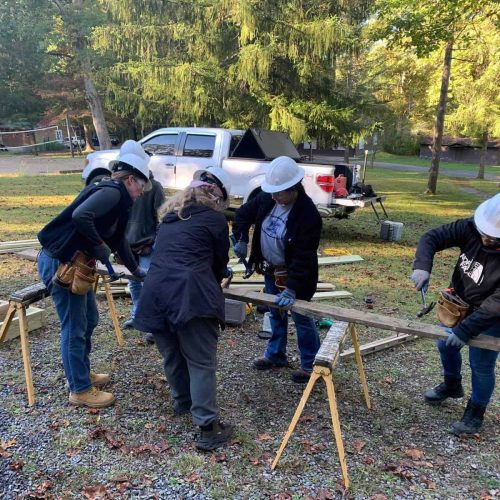
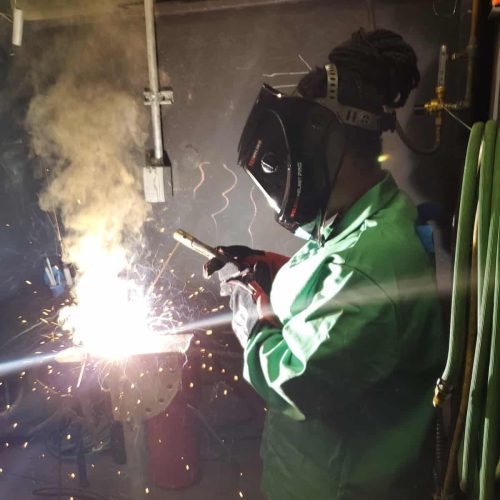
Step Up Construction has more than 20 years of experience helping individuals start new careers in the trades. Our program is built to support beginners and those with some experience who want a fresh start.
Here are a few reasons students choose Step Up:
We stay with you until you find work. We support graduates as they apply for jobs or apprenticeships, and we share openings from employers who reach out to us.
Tuition is free. Funding and scholarships cover the cost so you can focus on learning.
You can start earning quickly. Entry-level construction jobs often pay between 13 and 20 dollars per hour, with opportunities for raises and training as you grow.
Many jobs include benefits. A number of employers offer health insurance, retirement options, and paid training.
Step Up is completely free for students. Grants and donations cover the cost of the training and certifications.
We can only accept students who are 18 or older due to insurance requirements.
Many people ask if Step Up is only for women. The program was created with women in mind, but it is open to anyone who wants to learn new skills and start a career in the trades.
Transportation is not provided by the program. However, we can help you find options and resources in your area, and we offer mileage reimbursement for the days you attend in person as long as we have the funding to do so.
Hands-On Experience
You will get basic, introductory practice in areas like carpentry, electrical, plumbing, and an intro to welding when available. We focus on learning by doing so you can build skills in a real and practical way.
Career Readiness
We teach the job-readiness skills employers say they want, such as:
resume writing
interviewing
communication
budgeting
credit basics
job search strategies
workplace expectations
These lessons help you feel more confident and prepared when applying for jobs or apprenticeships.
Trade Exploration
You will meet a variety of industry professionals, including apprenticeship coordinators, contractors, and former graduates. You will also take site tours to see different workplaces and explore the many careers available in construction.
Certifications and Licenses
Every graduate earns:
OSHA 10 Construction
Plumber in Training License
HVAC Trainee License
Forklift Certification
First Aid, CPR, and AED
These certifications help your resume stand out to employers.
Step Up Construction is a 12-week program. This allows you to build skills, explore trades, and prepare for work without spending years in training.
What are the class hours?
Classes run Monday through Thursday from 9:00 AM to 4:00 PM with an instructor. Fridays are independent study days, where you work on:
your resume
math and career assignments
job applications
job shadows when available
When do classes start?
We offer Spring and Fall sessions each year. Classes often fill quickly, so we encourage applicants to apply as early as possible.
Do I need experience to join?
No experience is needed. Each class includes people with different skill levels. Some students have used tools before, and others are completely new. We start with the basics so everyone can learn safely and grow at a pace that works for them.
No. Step Up provides the tools and safety equipment needed during class. After graduating, some jobs may require you to buy basic tools. We can help you understand what tools are needed and how to start building your tool kit over time.
Students must wear jeans and a tee-shirt or sweatshirt each day, depending on the weather. Steel-toed boots are required every day for safety. We recommend clothing you do not mind getting dirty. All other safety gear will be provided during training. If you need help getting work clothing or boots, we may be able to assist depending on available funding.
You will get basic, introductory exposure to several trades. Hands-on work always includes carpentry, electrical, and plumbing. Intro to welding and other activities like masonry or auto maintenance may be offered depending on instructor availability. Site tours and guest speakers add even more ways to learn about different career paths.
Step Up prepares you for entry-level construction jobs or the chance to enter a registered apprenticeship. Job titles may include laborer, helper, installer, or apprentice in areas like carpentry, electrical, plumbing, HVAC, or general construction. We will share job openings with you throughout the program and help you explore which path fits you best.
We cannot guarantee a job, but we work hard to help you take the next step. We share job openings from employers, connect you with industry professionals, and prepare you for interviews. Many employers reach out to us when they are hiring, and we pass those opportunities along to students and graduates.
Many students come to Step Up with justice-involved backgrounds. A record does not disqualify you. Some employers have restrictions, but many others are willing to hire hardworking individuals who are ready to build a new future. We will help you understand your options and connect you to employers open to second-chance hiring.
Many students work while in the class. We can help you decide what is realistic for your situation.
Yes. Many students reapply and are accepted in a future session. Sometimes, the timing is just not right and we want you to have the best chance for success.
Step Up uses a demerit system similar to apprenticeship programs. Students receive demerits for absences or repeated lateness, and too many demerits can affect graduation. Because we cover a lot in a short time, it is difficult to go back and repeat missed lessons. We encourage daily attendance and open communication if challenges come up so we can help you stay on track.
We understand many students face challenges such as transportation, childcare, or personal stress. We work with students to find solutions and connect them to resources when possible.
Hands-on days may include standing for long periods, lifting materials, bending, or using tools. Tasks are basic and introductory, but they reflect real construction environments. If you have concerns about any physical tasks, please talk with staff so we can help you participate safely.
Sometimes. Construction careers often involve working in heat, cold, or rain, and our hands-on projects may take place outdoors or in shop spaces that are not fully climate controlled. We encourage students to dress for the weather. If you need help getting appropriate clothing, let staff know and we will assist when funding allows.
Students are expected to attend each day, participate in activities, complete assignments, and communicate with staff if they need help. The program moves fast, and taking responsibility for your learning helps you stay on track and get the most out of the experience.
Drugs and alcohol are not allowed during class hours or on program property. Many construction jobs and apprenticeships require drug testing for safety reasons, and we want students to be prepared for those expectations.
For more information about our programs, visit our FAQ page, or email: info@wvwomenwork.org.
